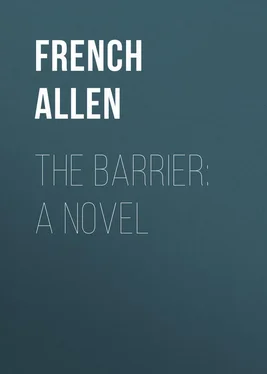Allen French - The Barrier - A Novel
Здесь есть возможность читать онлайн «Allen French - The Barrier - A Novel» — ознакомительный отрывок электронной книги совершенно бесплатно, а после прочтения отрывка купить полную версию. В некоторых случаях можно слушать аудио, скачать через торрент в формате fb2 и присутствует краткое содержание. Жанр: foreign_antique, foreign_prose, на английском языке. Описание произведения, (предисловие) а так же отзывы посетителей доступны на портале библиотеки ЛибКат.
- Название:The Barrier: A Novel
- Автор:
- Жанр:
- Год:неизвестен
- ISBN:нет данных
- Рейтинг книги:4 / 5. Голосов: 1
-
Избранное:Добавить в избранное
- Отзывы:
-
Ваша оценка:
- 80
- 1
- 2
- 3
- 4
- 5
The Barrier: A Novel: краткое содержание, описание и аннотация
Предлагаем к чтению аннотацию, описание, краткое содержание или предисловие (зависит от того, что написал сам автор книги «The Barrier: A Novel»). Если вы не нашли необходимую информацию о книге — напишите в комментариях, мы постараемся отыскать её.
The Barrier: A Novel — читать онлайн ознакомительный отрывок
Ниже представлен текст книги, разбитый по страницам. Система сохранения места последней прочитанной страницы, позволяет с удобством читать онлайн бесплатно книгу «The Barrier: A Novel», без необходимости каждый раз заново искать на чём Вы остановились. Поставьте закладку, и сможете в любой момент перейти на страницу, на которой закончили чтение.
Интервал:
Закладка:
Allen French
The Barrier: A Novel
LIST OF CHARACTERS
Stephen F. Ellis, promoter and political boss.
George Mather, a young business man.
Judith Blanchard, of the social set.
Mrs. Harmon, who has risen by her marriage.
Judge Abiel Harmon, advanced in years.
Colonel Blanchard, Judith's father.
Beth, his remaining daughter.
Mr. Price, the fashionable jeweller.
Mr. Fenno, head of one of the old families.
Mr. Pease, a banker.
Jim Wayne, of the social set.
Mr. Daggett, a supporter of Ellis.
Miss Jenks, Mather's stenographer.
Stock, a labor agitator.
THE BARRIER
CHAPTER I
There is a certain circle so well-to-do that it is occupied chiefly in guarding its property and maintaining its exclusiveness. There is a city so small, politically, that it is buttoned in one man's pocket. The second of these is the direct consequence of the first. Leading families lead little except the cotillion, parvenus crowd in, and things are done at which no gentleman will soil his gloves.
In the course of time, such a community might develop a strong active class and a superb set of figureheads, if only the two sorts would let each other alone. But the one will envy and the other sneer; the one will long for ornament and the other will meddle. A desire to sparkle meets the desire to appear to do, or at times encounters the genuine longing to do. Dirty hands will wish to be clean; clean hands must have a little honest dirt.
The city of Stirling lies in New England; it is one among those which look to Boston for supplies and to New York for fashions. Its history goes back to colonial times: hence those beautiful estates in the residential section and the air of pride in the scions of the old families. These said scions collect much rent and control much water-power, yet an inquirer imbued with the modern spirit might ask them to give an account of themselves. Their forefathers settled the country, fought in the Revolution, and helped to build the nation and the State, but now people whisper of degeneration. In the old city modern men have risen to power, control the franchises, manage the local government, and are large in the public eye.
Or perhaps it is more accurate to say that one man does this. Ellis the promoter, Stephen F. Ellis, has grown from nothing to everything, has consolidated businesses, mastered the city affairs, holds all the reins, pulls all the wires. The reform politicians have never harmed him. The fashionable people, according to their wont, for years have avoided publicity and let things go. The man among them who, in a generation, alone has ventured into the field of thoroughly modern enterprise, has failed signally, though most gallantly, and in the prime of his youth stands amid the ruins of a career. The very honour which was his inheritance brought him low.
He had been a contrast to Ellis in the openness of his methods and the rapidity of his success. To organise all the street-railways of his city, to force his personality upon the stockholders of three lines, and to weld the old clumsy systems into one efficient whole – that was George Mather's achievement. To be head and shoulders above all others of his years as the street-railway president, yes, and as the man in whom the reform politicians built their best hopes – that was his pride, and his class was proud of him. But his strength was his weakness, for he used no trickery and he kept his word. Therefore by a business stroke undertaken against him in the face of an agreement, a method not so analogous to a stab in the back as to the adroit administering of poison in a loving-cup, Mather was upon a certain spring morning, at a certain stock-holders' meeting, by a small but neat majority voted out of office, and stood robbed of the best fruits of his labours.
Those who saw him that afternoon upon the golf-course marvelled as he played his match with the precision of a machine. Had the man no nerves? But though thus he proved – to others, not to himself – that he could bear misfortune without flinching, it was with unspeakable relief that at last he slipped away into an empty corner of the club-house, whence he could hear only the buzz of the Saturday crowd on the grounds outside. The tension of the last few hours relaxed suddenly, and now that he was freed from the gaze of others he gave way almost to despair.
The silver cup which he had won he tossed upon the table, and dropping his clubs upon the floor he threw himself into a chair. Beaten! To have stood so high in the little city, to fall so suddenly, and to lose so much! True, he had made money; he had gained the support of the rich men of his class, who had assured him that they would wait their chance to set him again in his place. But it was Ellis who had seized that place: when had Ellis ever given up anything which he had gained? Yet it was not Mather's fall, nor the hurt to his pride, nor even the loss of the chance to carry out his plans, which shook him most, but the danger to still dearer hopes. And the young man, almost groaning, dropped his head upon his breast.
A girl entered the room suddenly, and stood startled at the sight of him, but she was not heard. She wished to withdraw, yet feared to rouse him, and his deep frown fascinated her. Staring downward, scowling with his thoughts, his face had at first expressed anger, but now showed pain. Judith, too, he was thinking – had she changed to him? When he hurried to her after this morning's meeting, so soon as he could free himself from his friends, already she had heard the news. She had not let him speak with her alone, but though she must have known his wish she kept her father in the room. If with her ambitions she felt disappointed in him, if she rejected him – well, he could bear even that! The girl who was watching saw his expression change to determination, and then suddenly he roused himself. No one should find him brooding. As he raised his eyes from the carpet she turned to escape, but he saw her and sprang to his feet.
"Judith!" She stopped; perceiving her desire he added: "Don't let me keep you."
Then she came to him directly. "I thought you were outdoors. Every one was congratulating you; the club has never seen such golf. It was splendid!"
He smiled, indifferent to the praise, and picking up the cup from the table, looked at it carelessly. "Only for that."
"And Jim Wayne would give his head for it," she said.
Disdainfully, he shifted the cup into his palm, and with a single effort crushed it out of shape. "See," and he meant to personify himself, "it is only silver; it lacks strength."
"Ah," she answered, "don't be bitter. Come, forget the street-railroad, forget you ever were its president, forget everything except your friends."
"Judith," he returned with meaning, "can you forget what I have lost?"
She drew back, flushing. "George!"
"Oh," he cried, "I know I am rude! But to-day when I came to see you, you knew what had happened to me. If ever I needed comfort it was then, and you knew it. There was only one consolation that would help me, and you knew that, but you denied me. Judith, have I lost my chance with you?"
She flushed, as if conscience drove home a rebuke. "I did not mean to be unkind." But then she looked about uneasily, at the door at her back, and at the curtains which shut off the adjoining room. "I – I think I must go."
"No," he protested. "Let us have it out; no one is near. Give me my sentence, Judith. You know I've loved you for years. It was for you I built up the railroad; you are the impelling cause of all my work. This winter I thought I had pleased you. Is there any hope for me?"
Читать дальшеИнтервал:
Закладка:
Похожие книги на «The Barrier: A Novel»
Представляем Вашему вниманию похожие книги на «The Barrier: A Novel» списком для выбора. Мы отобрали схожую по названию и смыслу литературу в надежде предоставить читателям больше вариантов отыскать новые, интересные, ещё непрочитанные произведения.
Обсуждение, отзывы о книге «The Barrier: A Novel» и просто собственные мнения читателей. Оставьте ваши комментарии, напишите, что Вы думаете о произведении, его смысле или главных героях. Укажите что конкретно понравилось, а что нет, и почему Вы так считаете.












